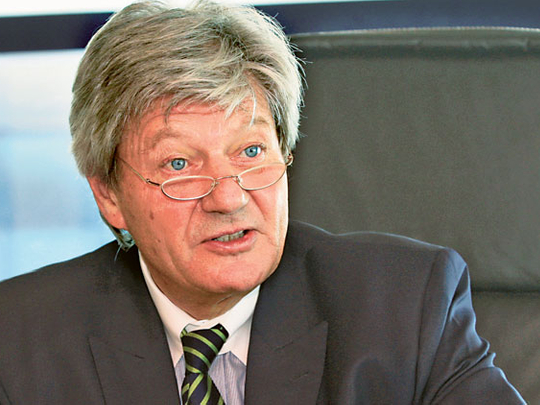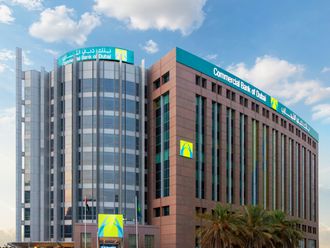
Dubai: Time is not standing still at Oman Insurance Company these days and Patrick Choffel has a lot to do with that. Since he took over as CEO in the fourth quarter of last year, he has presided over an overhaul of the management structure and now is focusing on widening the company's products and services.
All options are on the table for the country's largest insurance services provider, and some of these could well be taken up this year. A key factor behind these coordinated moves is to lessen dependence on its core insurance lines and markets.
Choffel, who started his career in the Middle East in 1969, offers glimpses of what the changes — subject to approval by the board of directors — would mean for the company. There could even be lessons for the wider insurance industry as it faces up to stable growth patterns rather than the spectacular returns of the past.
GULF NEWS: Will there be an enhanced focus on the corporate rather than the individual lines?
PATRICK CHOFFEL: You cannot dissociate the group from the individual and it's a big mistake many of us have made. When we insure groups, the biggest retail option is immediately the employees of those groups. That's where we need to focus more and specific strategies would be developed around them.
There is no specific time frame and will have to be decided as they present themselves.
Will creating new products on their own make up for the lack of opportunities on the investment income side?
A lot of insurers made a lot of money when there were favourable trends on the stock market. And everyone knows what happened to the investments when the markets went down.
The investment side of insurance companies should follow the main line of business — it should never try and lead it. The goal should be to have investments that create assets to match your liabilities.
If I sell a life insurance policy to you of 10 years, I should make sure that I have an asset that will generate ten years of income to pay what I owe you. Investments should follow my liability.
It's high time everyone focused on this as trying to make money on the stock markets is no longer the name of the game.
At our company, investments will support the liabilities we will engage in.
Oman Insurance's strengths historically have been on personal coverage, auto and medical insurance. Where do you see the opportunities to create new lines?
The market here is still under-penetrated; in fact the progression chart can be five or six times what exists today. There is scope to grow both in the existing line and non-developed lines.
For instance, the individual accident coverage is under-developed and so are the liability lines. Coverage for medical malpractice is sold, but very modestly. Another area of importance could be to offer small businesses protection against loss of profits on industrial risks.
Any specific growth areas you intend to target?
The big name of the game in the future will be pensions whereas today it's medical. If there's any enhancement on the severance pay, it can only be good for the local economy because you get funds to invest. We have to be ready for all of this.
Wouldn't it mean adding significantly to your costs to create the awareness and the network to sell these?
Look at the insurance industry over the past year. The awareness of the public has grown fast. The training to get these products into the marketplace starts with us, not with the public.
I don't think creating new products is capital-intensive. While we could create the products on our own, on major lines of business such as industrial or construction risks, the savvy is much more concentrated in London, continental Europe and New York. It's easier to learn from them rather than re-invent the wheel.
For the more day-to-day type of risk, be it on retail or SME, we can adapt it to the local market. It's our job.
In a market where more than 80 per cent of the population is expatriate and they remit money. This process is something that we can offer an insurance product for.
I have to work with the exchange houses and banks, and there's cross-border business to be done.
We could offer medical insurance for your family back home, but for which you pay here. That's a product we need to figure out.
Since you came in as the CEO, there have been major changes across the management. Is this more or less complete?
You never settle down on that side. If you look at the market today, people come and go. When I took over, most of the key players in senior management were gone. Some others left just as I was coming in and we more or crossed at the doors.
When you have this situation, the replacements have to be in line with the strategy you define.
Not everyone is suitable for one strategy. When you develop something new, you may need new people.
Reaching beyond UAE's borders
Dubai: Even as it cements its market leader status in the UAE, Oman Insurance Co is considering adding to its geographic reach. But all such plans will need approval from its board of directors.
Currently the company has a presence in Oman and Qatar, but the likes of Saudi Arabia, Iraq and even Turkey are rated as good prospects.
"Our non-UAE operations contribute decently, but not enough," said Patrick Choffel. "My desire is to grow geographically so that we can collect premium and opportunities outside of the UAE borders.
"If you look at the map, we should be in the big markets to be a big regional player. The locomotive today is Saudi Arabia and Iraq is the market of tomorrow. A potential big market is Turkey.
"It is clear an acquisition, joint venture or registration of subsidiaries in a new market will require additional capital. Whether it will be through own funding or whether we have to call for a capital increase is to be decided."










